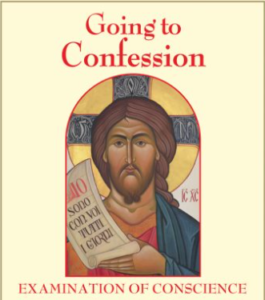How to prepare for the Mystery of Holy Confession?

Holy Confession without proper preparation is a grave sin. Our desire to confess to God is always challenged by Satan. As a consequence, we refuse to acknowledge that we have sinned, and we also try to justify or find excuses for our sins. We should be prudent to recognise that this is the Satan’s call and we should listen to the feeble voice within ourselves that we are doing yet another sin.
Confession is a Three-Step Process.
First, we must recognize our sins. As we get “holier,” we see better and better how truly awful our life is, how truly estranged we are from God.
Second, we must truly be sorry for the sins, and one of the true tests of our sorrow is the ability to confess those sins to another human being. We can be so prideful that we refuse to confess our sins because we are worried about what someone else might think about us.
Third, once our pride is defeated and the sin confessed, we must try to repent, overcome the sin and live a truly sinless life. Of course, the effort is in the struggle, since we cannot actually avoid acts of sin. But why should we confess to the priest?
1. First, sin separates us from God. The communion with God that was given on the first day of creation is fractured by sin, and eternal life can only be granted when that fracture is healed. Confession to the priest overcomes and heals this because the priest is the sacramental presence of Christ in the Church. When someone confesses to the priest, he is confessing to God Himself, thereby healing the fracture, which has occurred when someone sins. Our proper and intended relationship with God is restored when we confess to the priest.
2. Sin separates us from the Church. When we sin we break our relationship with the Church the body of Christ. We must confess them to restore our relationship with the Church. Our communion with the Church is fractured by sin, and healing can only take place when we bring our sin to the Head of the Church — who is Christ. The priest is the sacramental presence of Christ in the Church, and to restore unity with the Church, we confess to him.
3. Sin separates us from each other. Nowhere is the lack of communion between us and God that happens because of sin shown better than in how estranged we are from each other. Sin destroys my relationship with the “other,” and Christ Himself says that we can only know and love God when we know and love each other. So many of our sins are selfish, denying not ourselves, but the other.
We must confess our sins and repent of them to restore our relationship with the “other.” In the early Church that was very simply done — you stood up in the midst of the church community and confessed your sin, thereby healing that relationship with others. When problems with that system arose, the priest began to stand in the place of the community. So we also confess our sins to the priest because he is a man, created and fallible just like everyone else — standing in the place of everyone else.
When these three “healings” take place — between me and God, between me and the Church, between me and everyone else — then true healing begins, with the long struggle to overcome our sins and “be perfect as the heavenly Father is perfect.”

Preparation of confession includes three important steps:
Retrospection
Repentance.
Resolution.
RETROSPECTION:
The word retrospection means ‘looking back’. It implies taking stock of our past life. We have to assess, where we stand in relationship with God and our fellowmen. Each person must recall all of his/her sins, voluntary and involuntary. So retrospection would mean sitting with one self and recalling one’s sins. The sins have to be enlisted, first the ones forgotten in the last confession. Then, he/she must go carefully and attentively go back over his/her life to the extent possible and enlist the sins committed since the last confession. Without retrospection confession will not bear fruits. Review the Ten Commandments, 7 commandments of our Church, charitable acts. (A list will be provided). Read and meditate on relevant Gospel passages.

Repentance:
After the listing of the sins, one should be with a contrite heart (repentive heart/sorrowful heart/grieving heart). {In Greek Metanoia means change of mind (Meta – change and noia – mind) and in Hebrew (O. T.) Shub – retracing one’s steps back to right}. Repentance means changing of the mind, of thoughts, attitudes and feeling. It is the recognition of the responsibility and the guilt for the committed sins and man’s sinful nature. Weeping over your sins, as sin is a spiritual ailment, that brings death to your immortal soul, it deserves ceaseless, unending weeping and crying.
So one who confesses must have a completely penitent, remorse feeling, guilt stricken and contrite heart. A truly faithful believer sorrows and suffers when he retreats in solitude and remembers his/her sins, for he/she has angered God by breaking, disobeying or trespassing His law. The Holy Bible says in Joel 2: 12-13. “Return to the Lord with all your heart, with fasting and weeping and with mourning and rend your hearts, not thy garments”.
We must be truly humbled by our sins, must be sorry for having offended God by our sins and ashamed that we have wronged ourselves. There must be an outward expression of sorrow, shame, fasting, weeping and mourning. But this outward expression must spring from within i.e. why Joel says rend your hearts not your garments. Yes it is the rending of heart that which God requires and looks for – a broken and contrite heart, which He will not despise. Turn to the Lord – he says He is gracious and merciful – He will not only change His mind and reverse the sentence that he had to pronounce but He will change the sinner’s mind. David convinced of his sins, pours out his hear and soul to God in prayer (Ps 51). Against Thee and Thee only have I sinned, have mercy on me O God. (1) Blot out my transgressions (7) Wash me, cleanse me, purge me with hyssop (11) Take not Thy Holy Spirit from me, cast me not away from Thy Presence – Create a new heart in me. True repentance must be from the bottom of the heart as sins have their roots in the hearts. So there should be genuine repentance and humiliation without an excuse for sin or an attempt for self-justification.

Repentance is a U-turn. God => sin => God. A complete turn at 180 degrees.
Resolution
Repentance alone is not sufficient. This attitude needs to be accompanied by a willingness to change our ways and a continual will and effort not to remain in the state of sin. The Church teaches that the mystery of repentance is the Mystery by which man, having decided to renounce the sinful direction of his will, to renounce the sins by which one has lived so far and to destroy the sinful ill will within him.
The prodigal son, when he finally understood his folly, repented and said “I will arise and go to my father” and will say to him “Father I have sinned against heaven and before you” but his repentance did not end there but he arose and went to his father. So when you do wrong and feel sorry about it that is repentance. That’s good, but not good enough. But if you do wrong, then feel sorry, change your heart and decide not to do it again. That is what is required. It is probably impossible to eradicate all your inbred passions at once. But by God’s grace, by the help of a priest, by sincere repentance, by constant care and by a strong will not to do that again. – we could be corrected.
1 Comment
Beena John · June 23, 2023 at 2:33 pm
Thanks for the insight.